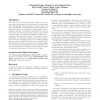Free Online Productivity Tools
i2Speak
i2Symbol
i2OCR
iTex2Img
iWeb2Print
iWeb2Shot
i2Type
iPdf2Split
iPdf2Merge
i2Bopomofo
i2Arabic
i2Style
i2Image
i2PDF
iLatex2Rtf
Sci2ools
58
Voted
RECSYS
2015
ACM
2015
ACM
Putting Users in Control of their Recommendations
The essence of a recommender system is that it can recommend items personalized to the preferences of an individual user. But typically users are given no explicit control over this personalization, and are instead left guessing about how their actions a↵ect the resulting recommendations. We hypothesize that any recommender algorithm will better fit some users’ expectations than others, leaving opportunities for improvement. To address this challenge, we study a recommender that puts some control in the hands of users. Specifically, we build and evaluate a system that incorporates user-tuned popularity and recency modifiers, allowing users to express concepts like “show more popular items”. We find that users who are given these controls evaluate the resulting recommendations much more positively. Further, we find that users diverge in their preferred settings, confirming the importance of giving control to users. Categories and Subject Descriptors H.5.3 [Group and Organ...
Related Content
| Added | 17 Apr 2016 |
| Updated | 17 Apr 2016 |
| Type | Journal |
| Year | 2015 |
| Where | RECSYS |
| Authors | F. Maxwell Harper, Funing Xu, Harmanpreet Kaur, Kyle Condiff, Shuo Chang, Loren G. Terveen |
Comments (0)

